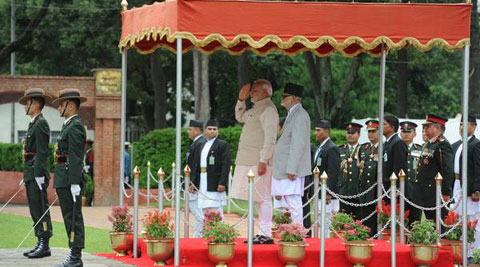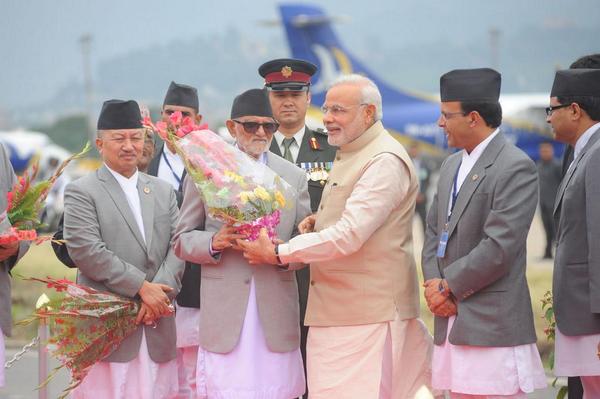Sujhata Nain for Dispatch News Desk
Kathmandu: India Prime Minister Narendra Modi has arrived here in Kathmandu, Nepal on Sunday and was received by Nepali Prime Minister Sushil Koirala. This visit of Modi is very important as he is the first Indian Prime Minister to pay a bilateral visit to Nepal in 17 years. “Visit of Modi to Nepal will start a new era of Indian-Nepal relationships”, this is what we believe in Kathmandu.
Modi brings goodwill, support and friendship with him. In his twitter message he says:
A formula for Nepal’s development- HIT; Highways, Information ways & Transways. India is ready to support Nepal in all of these sectors.
— Narendra Modi (@narendramodi) August 3, 2014
In recent years, the increasing dominance of Maoism in Nepal’s domestic politics, along with the strengthening economic and political influence of the People’s Republic of China has caused the Nepalese government to gradually distance its ties with India. However this visit will surely help to start a new area of bilateral relations between the two countries.
Kathmandu is giving a touch of festivity and people were welcoming Indian prime minister by standing at the both side the route from the airport to the hotel waving flags of both the countries.
Relations between India and Nepal have traditionally been close since ancient times as a result of geographical location and common religious, linguistic and cultural identities that overlap the two countries. Independent India and Nepal initiated their special relationship with the 1950 Indo-Nepal Treaty of Peace and Friendship and accompanying letters that defined security relations between the two countries, and an agreement governing both bilateral trade and trade transiting Indian soil. The 1950 treaty and letters stated that “neither government shall tolerate any threat to the security of the other by a foreign aggressor” and obligated both sides “to inform each other of any serious friction or misunderstanding with any neighbouring state likely to cause any breach in the friendly relations subsisting between the two governments.” These accords cemented a “special relationship” between India and Nepal that granted Nepal preferential economic treatment and provided Nepali in India the same economic and educational opportunities as Indian citizens. The Indo-Nepal border is open; Nepalese and Indian nationals may move freely across the border without passports or visas and may live and work in either country.


